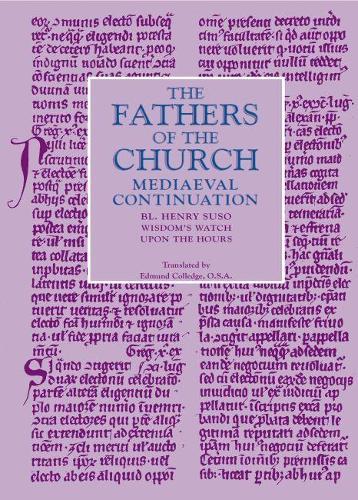Overview
Written by Dominican preacher and mystic Bl. Henry Suso (c. 1300-1366), Horologium Sapientiae, or Wisdom's Watch upon the Hours, was one of the most successful religious writings of its time. Now it is offered to the English-speaking world in a new translation based on Pius Knzle's critical Latin edition. Essentially a dialogue between the author and Divine Wisdom, the Watch tells of Suso's service to and espousal of Wisdom, his """"most cruel bride,"""" with a charm reminiscent of contemporary chivalric romance literature. The Watch's many readers doubtless esteemed it for its devotional fervor and for the solutions Suso offers to the problems inseparable from a sincere Christian life. He teaches that a devotion of sharing in the Savior's self-sacrifice is the path to spiritual perfection, as well as a consolation for the soul amid life's cares. Based on his own shrewd observations on shunning """"sensory forms and earthly imaginings,"""" Suso develops the essential elements of ascetic and mystical theology. He keenly observes and judiciously criticizes the abuses of his own times and the rise of secularism, hedonism, and materialism. He writes of his yearning for a way of life that was fast disappearing, for the piety and simplicity of the country folk he had known as a boy. For Suso, the """"Christocentric Boethius,"""" the men and women of his youth were heirs of the Eternal Wisdom, founded on Christ and found in Christ, which was being lost and forgotten in the new urban cultures. The Watch's autobiographical content is especially interesting for those who follow the repercussions of the condemnation of Meister Eckhart, Suso's revered teacher, in 1329. Eckhart had been condemned for heresy, and Suso uses allegory to show perceptive readers how he found a way to dissent from this judgment and yet remain the Holy See's loyal and faithful servant. Throughout most of his life, Suso suffered the jealousy of his confreres and remained ever conscious of the dangers of uncritically applying Eckhart's principles; these troubles too are expressed allegorically here.
Full Product Details
Author: Heinrich Seuse ,
Edmund Colledge
Publisher: The Catholic University of America Press
Imprint: The Catholic University of America Press
Dimensions:
Width: 13.90cm
, Height: 2.00cm
, Length: 21.50cm
Weight: 0.415kg
ISBN: 9780813226422
ISBN 10: 0813226422
Pages: 346
Publication Date: 31 January 2014
Audience:
Professional and scholarly
,
Professional & Vocational
Format: Hardback
Publisher's Status: Active
Availability: Out of stock

The supplier is temporarily out of stock of this item. It will be ordered for you on backorder and shipped when it becomes available.
Author Information
Edmund Colledge, O.S.A., was professor of vernacular literature at the Pontifical Institute of Mediaeval Studies from 1969 until 1982, when he retired with the title of emeritus professor of the University of Toronto. He is co-author of The Chastising of God's Children (1957) and A Book of Showings to the Anchoress Julian of Norwich (1978).




